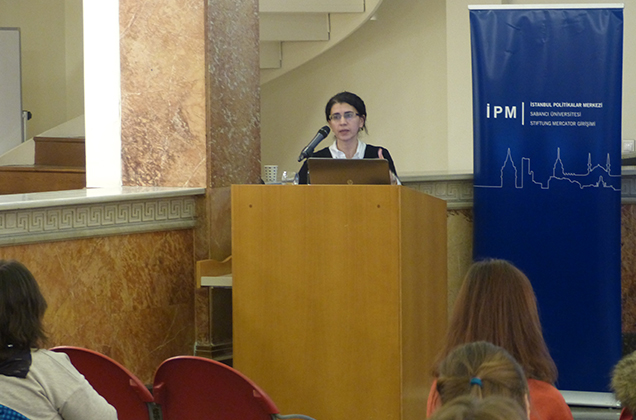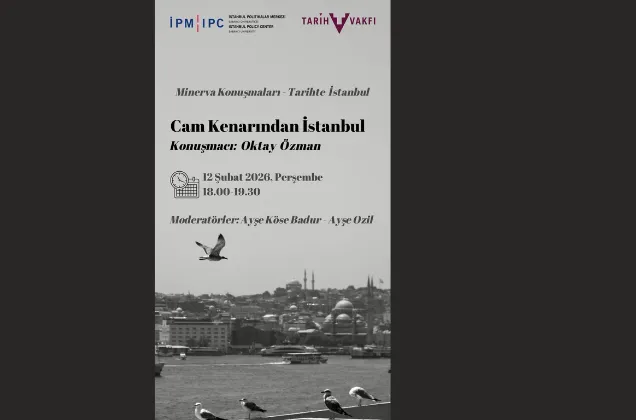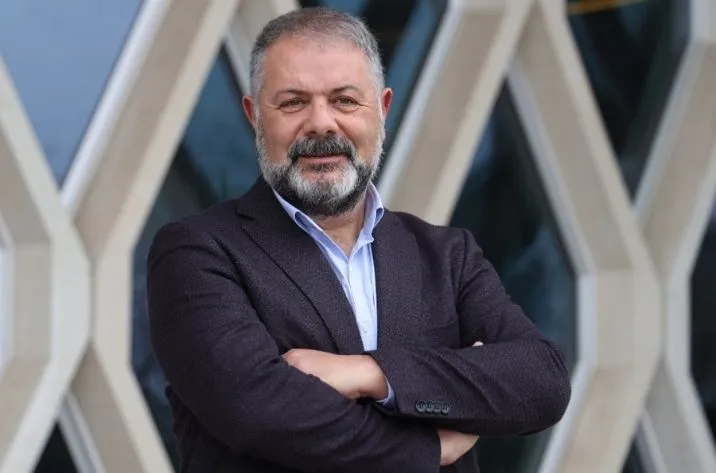21/03/2019
IPC Climate Cafe Talks continued with "Global Climate Change and Emissions Trading: Recommendations for a Green Economy Design"
In order to improve the effectiveness of policies like Emissions Trading System, understanding the preferences of the institutions to be affected should be a priority

The March meeting of the Climate Cafe Talk series, a bi-monthly event held by the Sabancı University Istanbul Policy Center, featured Istanbul Bilgi University Environment, Energy and Sustainability Research and Application Center Director Associate Professor Ayşe Uyduranoğlu. The research team discussed their "Green Implementation Practices Index" and recommendations about emissions trading and green economy design based on their ongoing studies.
The March meeting of the Climate Cafe Talk series, a bi-monthly event featuring scientists and academics working on Climate Change to cover climate change-related issues from politics to atmospheric sciences, economics and psychology, was held by the Sabancı University Istanbul Policy Center.
The speaker in the March Climate Change Talk of the series was Associate Professor Ayşe Uyduranoğlu, Director of the Istanbul Bilgi University Environment, Energy and Sustainability Research and Application Center, whose lecture was titled "Global Climate Change and Emissions Trading: Recommendations for a Green Economy Design".
The speakers also discussed a project supported by TÜBİTAK and the support provided to the Emissions Trading System. Based on the "Green Implementation Practices Index" designed by Istanbul Bilgi University Environment, Energy and Sustainability Research and Application Center Director Associate Professor Ayşe Uyduranoğlu and Catholic University of Portugal Faculty Member Assistant Professor Zahide Eylem Gevrek, recommendations were made on emissions trading and green economy design.
Some highlights of the presentation:
“The World Economic Forum named failure in fighting global climate change one of the top five threats to the world's economies. Meanwhile, Paris Accords emphasize the critical importance of keeping global warming limited to 2°C by the end of the year. To achieve this objective, not only developed countries, but also developing countries, including Turkey, must take responsibility. Carbon pricing and emissions trading are among policies that may prove effective in fighting climate change. Based on available data, the “Green Implementation Practices Index” shows that companies which prioritize ecological sustainability and green practices are more likely to support emissions trading. Since emissions trading is a new policy instrument, businesses also want it to be designed as to minimize uncertainties during rollout. “
Turkish Policymakers: Climate Change Policy
Ayşe Uyduranoğlu continued that the Climate Change Action Plan prepared by the Turkish Ministry of Environment and Urban Planning in 2011 was the most extensive study completed to date, and emphasized the necessity for building an emissions trading system (ETS) in Turkey and linking it to other global/regional systems, while the report issued by TÜSİAD in 2016 called policymakers to consider the preferences of businesses when designing an ETS.
Emissions Trading System Preferences of Global Industries
Ayşe Uyduranoğlu said that the survey they conducted with 1250 individuals in 23 provinces was the first study on industrial ETS based on preferences, explaining that they adopted a holistic approach as the issue concerned the entire industry, and explored what properties a carbon tax would need to have in order to garner acceptance.
Uyduranoğlu continued that the study, based on choice modeling, was conducted in 13 Turkish provinces including Istanbul, Bursa and Gaziantep with 404 companies operating in the glass, steel, cement, iron, energy, paper, metal and ceramics industries. According to the responses given to choices composed of different combinations, businesses prefer an ETS where:
l Past emissions volumes are taken as baseline for each company;
l Quotas have an expiry of 3 years;
l Businesses can purchase as much as they want;
l Fluctuations in quota prices are regulated by the government.
Uyduranoğlu concluded that, since ETS is a system that is not yet implemented, businesses would prefer that the design minimizes uncertainties in the early phases of implementation. She explained that the pilot implementation of ETS in the European Union (2005-2007) led to considerable improvement in the system based on experience.
About Ayşe Uyduranoğlu
Ayşe Uyduranoğlu has a bachelor's degree from the Istanbul University Faculty of Economics. She pursued a PhD in economics at the University of Exeter from 1994 to 1999. Since 2000, she has been a member of the Istanbul Bilgi University Faculty of Administration. She is also the director of the Environment, Energy and Sustainability Research and Application Center (ÇESUAM). Uyduranoğlu has published articles in environmental economics in national and international journals. Her areas of interest are environment taxes, sustainable transport, climate change, and green budgets.
About Climate Cafe Talks
Climate Cafe Talks was launched by the Sabancı University Istanbul Policy Center in the 2017-2018 academic year. So far, the series held 5 events and received 200 guests, and plans to hold another 5 events in the 2018-2019 academic year.
The bi-monthly event is a venue for scientists and academics working on climate-related issues to to reveal and discuss their work. Climate Cafe Talks provides an interdisciplinary environment to cover climate change-related issues from politics to atmospheric sciences, economics and psychology.




